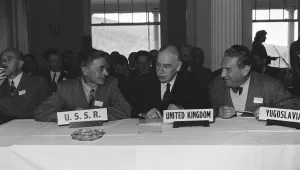International Security is America's leading peer-reviewed journal of security affairs.
Summary
States use wedge strategies to prevent hostile alliances from forming or to disperse those that have formed. These strategies can cause power alignments that are otherwise unlikely to occur, and thus have significant consequences for international politics. How do such strategies work and what conditions promote their success? The wedge strategies that are likely to have significant effects use selective accommodation—concessions, compensations, and other inducements—to detach and neutralize potential adversaries. These kinds of strategies play important roles in the statecraft of both defensive and offensive powers. Defenders use selective accommodation to balance against a primary threat by neutralizing lesser ones that might ally with it. Expansionists use selective accommodation to prevent or break up blocking coalitions, isolating opposing states by inducing potential balancers to buck-pass, bandwagon, or hide. Two cases—Great Britain’s defensive attempts to accommodate Italy in the late 1930s and Germany’s offensive efforts to accommodate the Soviet Union in 1939—help to demonstrate these arguments. By paying attention to these dynamics, international relations scholars can better understand how balancing works in specific cases, how it manifests more broadly in international politics, and why it sometimes fails in situations where it ought to work well.
Crawford, Timothy. “Preventing Enemy Coalitions: How Wedge Strategies Shape Power Politics.” Spring 2011
The full text of this publication is available in the link below.





